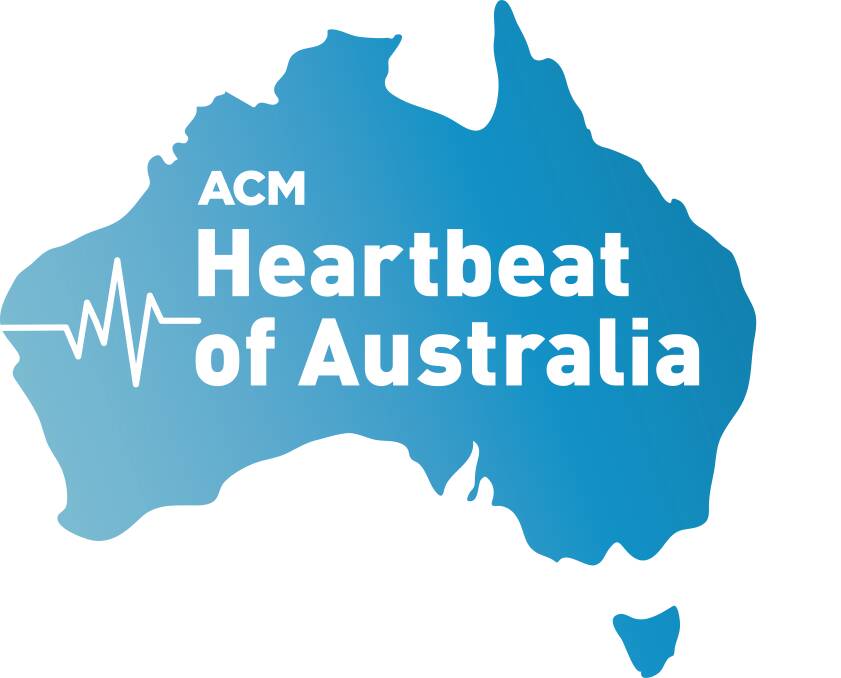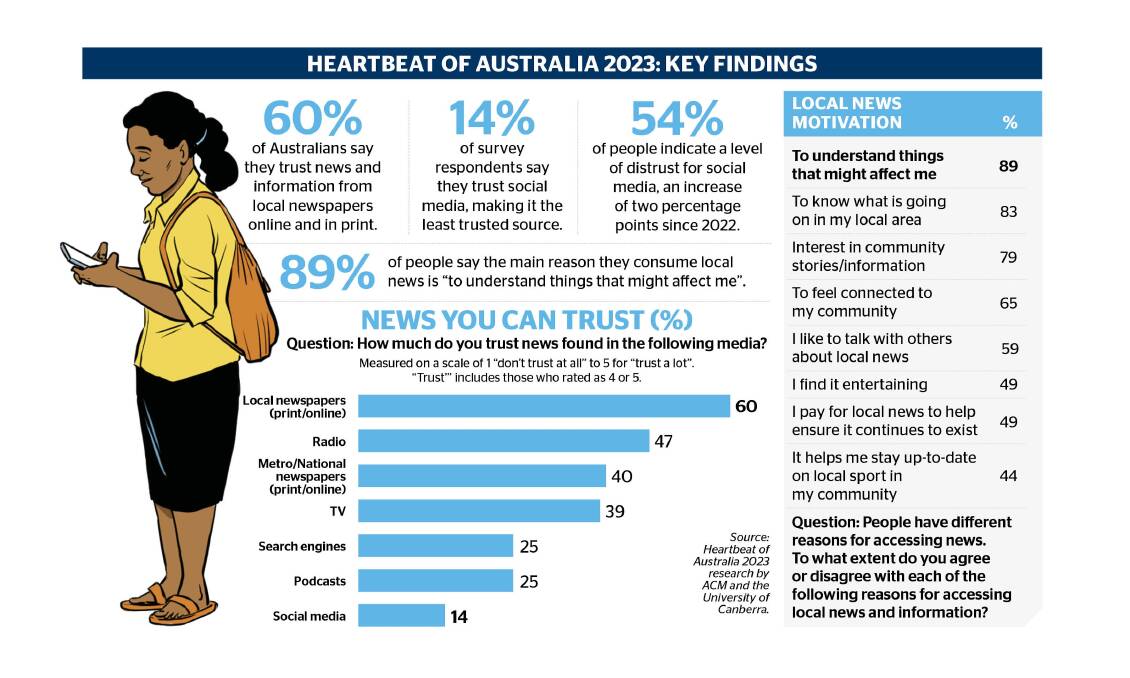If you're reading this story on the printed page of your favourite ACM newspaper or online via our news app on your phone, the latest Heartbeat of Australia research tells us a lot about how you're feeling in 2023, why shopping locally and reading local news matters to you and how living your life connected to your local community contributes to your wellbeing.
More than 6000 Australians took part in the second annual Heartbeat survey conducted by ACM's research unit Chi Squared in partnership with the University of Canberra. ACM is the publisher of this masthead and its annual study aims to capture the sentiments of Australians nationwide - from those living in rural areas, regional population centres and the ACT to metropolitan residents of the major five state capitals: Sydney, Melbourne, Brisbane, Adelaide and Perth.
Based on 6316 individual online responses between March and May, Heartbeat also compares the viewpoints of readers of ACM newspapers and websites and non-readers.
The results are revealing: 89 per cent of people say they access news because it helps them understand things in their community that might affect them and 86 per cent of those who consume local news say they are feeling satisfied with life in 2023, compared to 61 per cent of those who do not access local news.
The number one issue of concern for Australians this year is the cost of living, with 75 per cent of all respondents nominating it as the most pressing concern in their personal life - up 21 percentage points from last year's inaugural Heartbeat survey.

"The study shows cost of living concerns are more prevalent among women (79 per cent), those under 45 (79 per cent) and people living in the capital cities (77 per cent)," ACM research director Alex Milhalovich said. "When the second survey was conducted we'd just been served 10 consecutive rate rises so, unsurprisingly, in addition to the cost of living there is also widespread concern about financial debts, energy costs and housing affordability."
While the overall measure of sentiment, called the "life satisfaction index", appears relatively stable since 2022 (at 7.1 versus 7.2 last year), people living in regional areas scored more positively at 7.4 versus 6.4 for metro respondents.
(The index is calculated from the question: "Thinking about your life and personal circumstances, how satisfied are you with the following: Your standard of living; Your health; What you are achieving in life; Your personal relationships; How safe you feel; Feeling part of your community; Your financial situation. Your life as a whole." The index averages scores on a scale of 1-10.)
Heartbeat researcher Professor Sora Park, of the University of Canberra, said Aussies aged over 45 had higher life satisfaction than under-45s "on every measure".
The biggest gaps were in standard of living (39 per cent of over-45s said they were satisfied versus 20 per cent of under-45s) and personal relationships (42 per cent for over-45s versus 24 per cent for under-45s).
"Less than one in five people aged under 45 feel part of the community, with 29 per cent for over-45s and only 16 per cent for those aged under 45," Professor Park said. "The 18 percentage point gap in personal relationship satisfaction between younger and older Australians is related to people settling down and starting families later.

"It's not like it used to be where you married your first partner, had the white picket fence and two children by the age of 30. In the 21st century personal relationships are much more complex and priorities are elsewhere in the early years."
Among readers of print newspapers, 87 per cent said they were satisfied with life, compared to 61 per cent of those who didn't access news. Local newspapers were the source of news trusted the most (60 per cent), ahead of radio (47 per cent), metro/national newspapers (40%) and TV (39 per cent). That trust was strongest among regional Australians and over-45s.
The least trusted source (14 per cent) was social media, with 54 per cent of all people indicating a level of distrust - up by 2 percentage points from 2022.
Mr Mihalovich said Heartbeat showed a strong link between the consumption of trusted local information and a person's feeling of community connection, with 83 per cent of survey respondents saying that knowing what's going on in their community was key to their sense of connection.
"We found that those who consume local news have a deeper connection to their community, a greater level of positive wellbeing and are better placed to be able to cope with life's challenges." he said. "So, it's no surprise that the under-45s, who consume less trusted local content than the over-45s, are much more likely to have negative feelings about the future, including loneliness and stress. They also feel more pessimistic and less optimistic when they think about the future."
Overall, more Australians (68 per cent) prefer to get their news online than in print (32 per cent). The top reason for consuming local news was to "understand things that might affect me" but 49 per cent said they did it to support the funding of local journalism - a motivation that was stronger among regional Australians (58 per cent) than in metro cities (31 per cent). Regional newspaper readers also wanted to see more advertising from local businesses (60 per cent) and local government (48 per cent).
Heartbeat findings will be presented at APAC Advertising Week in Sydney in August.
"Relevant news and information is vital for the sustainability of our regional towns," ACM managing director Tony Kendall said. "This study shows that without a regional independent voice our communities have no trusted way of staying connected."

